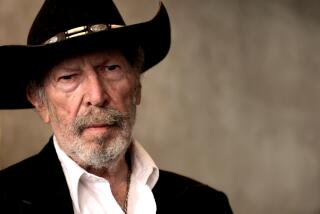Albert B. Friedman, 86; authority on folk ballads
Albert B. Friedman, a retired authority on folklore and balladry at what is now Claremont Graduate University, whose work anticipated the folk music revival of the late 1950s and 1960s, died Nov. 11 at Kaiser Permanente Los Angeles Medical Center. He was 86.
The cause was a heart attack, said a friend, writer Aris Janigian.
Friedman was best known as the author of “Folk Ballads of the English-Speaking World,” a 455-page compilation of traditional songs from Britain and America that records a wide range of experience, including romantic tragedies, supernatural events and exploits of cowboys and outlaws.
Considered a standard textbook in the field, it “introduced generations of students to folk music scholarship,” said Timothy Lloyd, executive director of the American Folklore Society.
Friedman also wrote “The Ballad Revival,” which pioneered the literary study of ballads.
He called ballads “illiterature” because they are an “oral phenomenon,” created in earlier eras by people who were limited in their ability to read and write.
“Folk Ballads of the English-Speaking World” often presents versions of the same song to show the mutable nature of oral culture.
“So it is that though a poem has a fixed form, standing as the poet left it when he gave it to a scribe or to the press, ballads alter with every singer,” Friedman wrote.
Many of the songs he included became familiar to modern audiences through Joan Baez, Bob Dylan and other singers. Baez, for instance, offered popular versions of 13 traditional folk songs on her 1960 debut album, including “Henry Martin,” a 16th century tale of piracy on the high seas, and “Mary Hamilton,” a ballad about the hanging of a promiscuous lady-in-waiting that Friedman traces to the same period.
“He asked what were people trying to express through these songs,” said Janigian, who knew Friedman for 10 years. “He saw them as containers of not just cultural wisdom but of facts not logged in books, and ways of life.”
Friedman, who was born in Kansas City, Mo., on Aug. 16, 1920, was the fifth of 12 children of Lithuanian Jewish immigrants. He earned a bachelor’s degree at the University of Missouri in 1941 and a master’s degree at Harvard University before serving in an Army intelligence unit in Asia during World War II.
After the war, he returned to Harvard and earned a doctorate in medieval studies in 1952. He was an assistant professor there from 1955 to 1960, when he joined the faculty at what was then called the Claremont Graduate School.
He retired in the mid-1980s and moved to the Hollywood Hills, where he devoted himself to painting.
Friedman is survived by two sisters, Dorothy Flekier of Kansas City and Evelyn Denenberg of Boynton Beach, Fla.
More to Read
The biggest entertainment stories
Get our big stories about Hollywood, film, television, music, arts, culture and more right in your inbox as soon as they publish.
You may occasionally receive promotional content from the Los Angeles Times.











